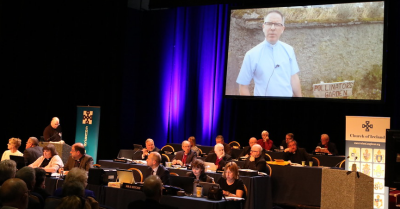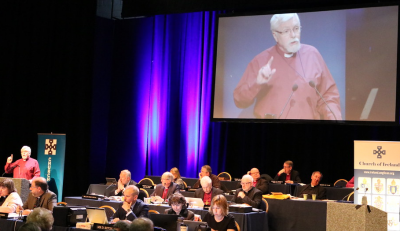 The Church of Ireland’s General Synod met in Derry/Londonderry for the first time from 16th– 18th May. What churches and individuals can do to combat climate change and biodiversity was one of the major themes of the meeting.
The Church of Ireland’s General Synod met in Derry/Londonderry for the first time from 16th– 18th May. What churches and individuals can do to combat climate change and biodiversity was one of the major themes of the meeting.
The Church and Society Commission showed a short film which was introduced by Rev. Andrew Orr. It highlighted the work of three parishes: Carlow, who have been working on biodiversity in their churchyards; Holywood, who have moved away from single use plastics, and Bushmills, who audited their energy use and installed solar panels on the church roof.
Andrew went to talk about the All Ireland Pollinators Campaign, and distributed the Faith Communities Pollinators Plan, along with ECI’s own leaflet to all the delegates. Bishop Ken Kearon of Limerick highlighted the work being done by churches all across the country and Bishop Harold Miller of Down urged people to support Tear Fund’s “This is a Rubbish Campaign” to reduce their use of plastic.
A Synod fringe event was organised by Stephen Trew, with about 40 people attending. Stephen proposed that the Church of Ireland should attempt to go “carbon-neutral” by 2030 and asked those attending to brainstorm ideas. These included:
- Complete an Energy Audit of CoI parishes – measure energy usage and emissions of parishes – Diocesan Councils to request units of energy (electricity, oil and gas) from parishes annually;
- Set achievable targets for reducing energy usage for electricity, heating and transport;
- Set a realistic target date to achieve Net Zero Emissions (between 2030 – 2045);
- Launch a scheme to help parishes insulate clergy homes – 300 homes in 10 years;
- Reform the locomotory allowance – electric cars to be given maximum mileage allowance. Phase out allowance for internal combustion engine cars;
- Set targets to reduce mileage traveled to administrative meetings by increasing the use of audio and video conferencing;
- Set targets for reduction in air miles traveled by bishops;
- Invest in tree planting or peatland restoration to offset emissions that cannot be eliminated;
- Encourage parishes to become Fairtrade and single-use plastic free.
The work of Eco-Congregation was mentioned many times by speakers and there was a great deal of interest from the delegates present.

